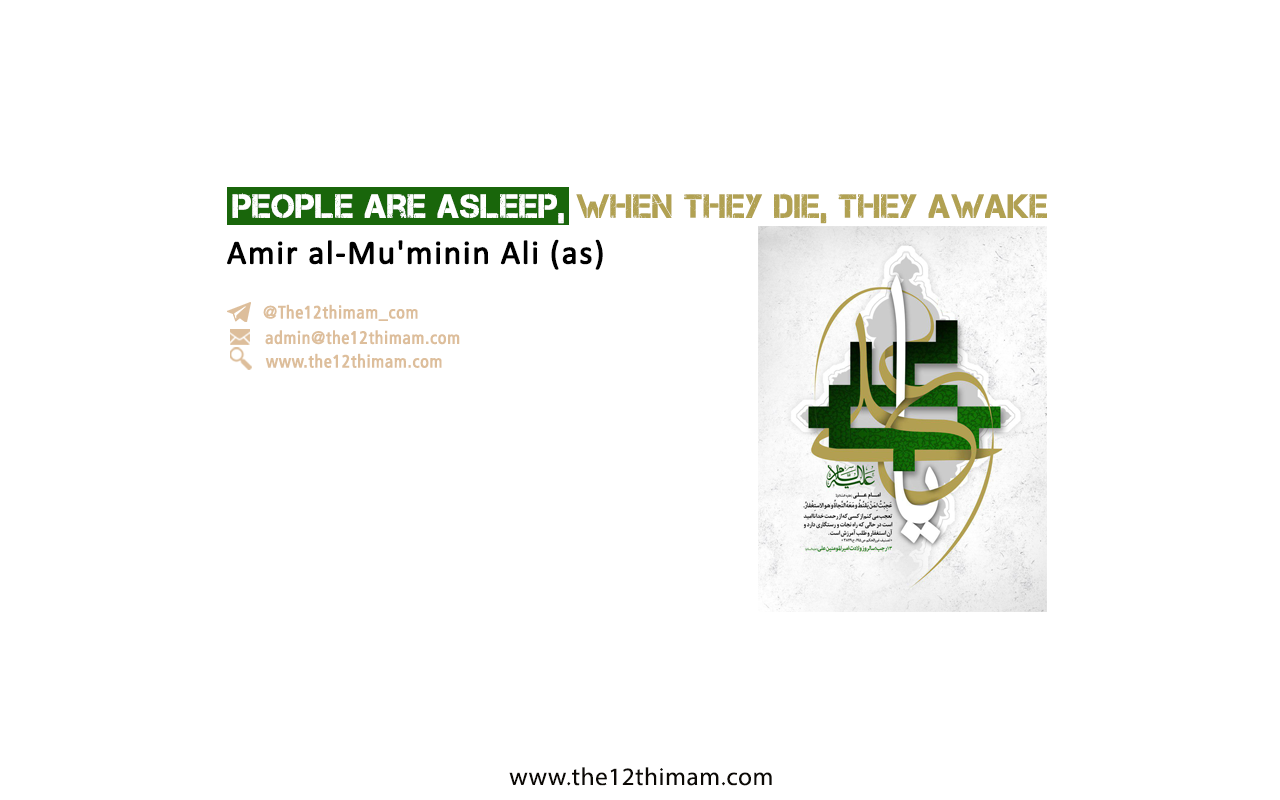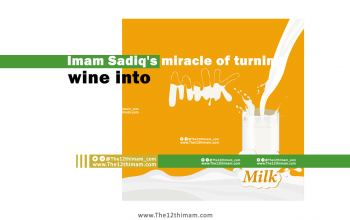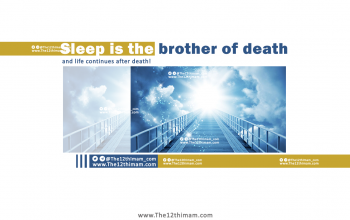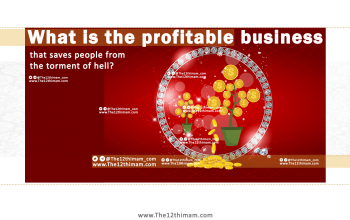You may have realized that when man is asleep, he is unaware of what happens in the world.
This unawareness of the world in sleep indicates man’s negligence towards the world in this state.
Here we review a very important and beautiful hadith of Amir al-Mu’minin Ali (as) in this regard.
Imam Ali (a) stated:
النّاسُ نِیامُ إذا مَاتُوا اِنْتَبَهُوا
“People are asleep; when they die, they awake.”
The Qur’an also states:
وَ مَا هَـذِهِ الْحَیَوةُ الدُّنْیَآ إِلاَّ لَهْوٌ وَ لَعِبٌ وَ إِنَّ الدَّارَ الاْخِرَةَ لَهِىَ الْحَیَوَانُ لَوْ كَانُوا یَعْلَمُون
“The life of this world is nothing but diversion and play, but the abode of the Hereafter is indeed Life (itself), had they known!” (29:64)
By matching the magnificent statement of Amir al-Mu’minin Ali (a) with the above verse, one can see that true life or existence is indeed the hereafter or the eternal world, upon which man’s eyes are closed in this world, and compared to which the life in this world may seem like a dream with no truth beyond it. (That is, when you dream, because you are preoccupied with your life in the dream world, you never realize that this real world exists, while it actually exists.)
In other words, man also lives in his dream, and many things that he does and many bitter and sweet things that happen to him in his dream life will disappear when he awakes and enters in the real world of awakening.
The relation between the life of this world and the hereafter is like sleep and awakening. And as after awaking, we may be astonished by what has happened to us in our dream and its baselessness, and may feel comfort or regret over it, death is also awaking from this world and opening the eyes to true life of the hereafter, which arouses our surprise and regret over what has happened to us and the fantasies which preoccupied us.
The conception of the world as a dream is the veil of negligence that falls on man’s eyes because of being preoccupied by the life of this world. And it is not long before this veil is torn by death and the eyes of man are opened to the truth.
So we are in a long sleep of negligence toward the teachings of religion and that is why most people in the world like those who are asleep neglect the hereafter; and when they die, they find that they have brought nothing with them from what they had earned in the world.
People live in this world as if they are in a sleep of unawareness. They are not aware of the truth of what they do, and what they have in mind is like illusion that has no true basis. When they die, the veils are removed and they see the truth; they remember all the actions of the heart, the limbs and the character and become aware of the truth of their actions and behavior.
When the veils are removed, they realize the existence of God, the prophets, the Imams, the angels and the Hereafter, and then the new life in the hereafter will begin and the questioning will begin; the question from ourselves why we lived in negligence and the questions of God Almighty that we must answer.
Here, for instance, we view some questions we must answer in the first moments of the hereafter.
The Prophet (s) said:
“Verily, when a servant enters his tomb, two angels come to him (one is Munkar and the other is Nakir), and the first thing they ask him is about his God, his prophet and his Imam. Then, if he answers, he will be saved; but if he remains speechless and has no answer, he will be punished” (that is he will go to the hell).
(However, it should be noted that God is the All Compassionate and Most Merciful; if the servant believes in Him, repents and acts righteously, God will forgive his sins and accommodate him in the eternal paradise.
But some people go to the hell because of their own negligence; like when it is announced in a city that a heavy storm will hit the city tomorrow, if someone ignores the warning and stays in the city, certainly any disaster would come to him, it would be his own fault and not others’.
God is the All-Compassionate and Most Merciful. He sent the prophets, the Imams and the Book of guidance, i.e. the Qur’an, and warned people about the hell and gave His servants good news of the eternal paradise. But, if a person ignores these warnings and lives in negligence, it is his own fault; for, God would not forcefully take anyone to the hell, rather He sent the prophets, the Imams and the Book, i.e. the Quran, to awake people from negligence and to lead them to the eternal paradise. This is a sign of God’s compassion, love and mercy for His servants.)
Let’s return to our discussion:
At this moment, one sees the truth and realizes that he has lived in negligence, and that his life has been based on ignorance and unawareness of his self, like a person who lives and acts in a dream unaware of himself.
In this regard, God Almighty gives us an example in the Qur’an:
God sent Moses and Aaron (a) to Pharaoh to invite him to worship God and forbid him from the tyranny and corruption he made on the earth.
The Qur’an says about it:
وَإِذْ نَادَىٰ رَبُّكَ مُوسَىٰ أَنِ ائْتِ الْقَوْمَ الظَّالِمِينَ ﴿١٠﴾
When your Lord called out to Moses: [saying,] “Go to the wrongdoing people” (26:10)
قَوْمَ فِرْعَوْنَ أَلَا يَتَّقُونَ ﴿١١﴾
The people of Pharaoh. Will they not be wary [of Allah]? (26:11)
But Pharaoh answered:
قَالَ فِرْعَوْنُ وَمَا رَبُّ الْعَالَمِينَ ﴿٢٣﴾
Pharaoh said: ‘And what is “the Lord of all the worlds?”‘ (26:23)
Notice that in this verse, Pharaoh does not say who is the Lord of the worlds? Rather, he says what is the Lord of the worlds?
Here you can notice how ignorant Pharaoh was so that he did not know what is the Lord of the worlds (or what does God mean)?
And prophet Moses (a) replies to Pharaoh:
قَالَ رَبُّ السَّمَاوَاتِ وَالْأَرْضِ وَمَا بَيْنَهُمَا إِنْ كُنْتُمْ مُوقِنِينَ ﴿٢٤﴾
He said, “The Lord of the heavens and the earth and whatever is between them, should you have conviction.” (26:24)
And this ignorance of Pharaoh because of not knowing and not believing in the Lord of the worlds and the prophets, and neglecting the Hereafter made him claim to be a god and make rebellion, corruption and oppression on the earth (since due to his lack of belief in God and the afterlife, he also did not believe in the judgement and the reckoning in the Hereafter.
In this regard, the Qur’an also says:
هَلْ أَتَاكَ حَدِيثُ مُوسَىٰ ﴿١٥﴾
Did you receive the story of Moses? (79:15)
إِذْ نَادَاهُ رَبُّهُ بِالْوَادِ الْمُقَدَّسِ طُوًى ﴿١٦﴾
When his Lord called out to him in the holy valley of Tuwa? (79:16)
اذْهَبْ إِلَىٰ فِرْعَوْنَ إِنَّهُ طَغَىٰ ﴿١٧﴾
[And said,] ” Go to Pharaoh, for indeed he has rebelled, (79:17)
فَقُلْ هَلْ لَكَ إِلَىٰ أَنْ تَزَكَّىٰ ﴿١٨﴾
And say, “Would you purify yourself? (79:18)
وَأَهْدِيَكَ إِلَىٰ رَبِّكَ فَتَخْشَىٰ ﴿١٩﴾
I will guide you to your Lord, that you may fear [Him]? (79:19)
فَأَرَاهُ الْآيَةَ الْكُبْرَىٰ ﴿٢٠﴾
Then he showed him the greatest sign. (79:20)
But he denied, and disobeyed. (79:21)
Then he turned back, walking swiftly. (79:22)
And mustered [the people] and proclaimed, (79:23)
فَقَالَ أَنَا رَبُّكُمُ الْأَعْلَىٰ ﴿٢٤﴾
Saying, “I am your exalted lord!” (79:24)
You can see in the above verses that Pharaoh made rebellion and corruption and claimed to be a god because of not knowing and not believing in God and the Hereafter.
It is a consequence of negligence that makes man cruel and corrupt in this world and leads him to the hell in the Hereafter.
Is awakening after death or believing after death of any benefit to us?
The Qur’an reveals the last moments of Pharaoh’s death, when the veils were removed and Pharaoh realized that prophet Moses and Aaron (a) were right that there exists the One God, there is no god except Him, and there is the Hereafter and the Judgement Day, when reckoning of our accounts is made by angels and that he was in negligence, and says:
We carried the Children of Israel across the sea, whereat Pharaoh and his troops pursued them, out of defiance and aggression. When overtaken by drowning, he called out, “I believe that there is no god except Him in whom the Children of Israel believe, and I am one of those who submit [to Him]!” (10:90)
In the above verse, Pharaoh who sees himself at the last moments of his life while he was drowning, and finds the hereafter present in front of him by removing the veils away from his eyes, and actually awaked from his negligence, at that moment says: “I believe that there is no god except Him in whom the Children of Israel believe and I am one of those who submit [to Him]” (here the statement of Imam Ali (a) that “people are asleep, when they die, they awake” comes true.)
Let’s return to the answer of our question:
Do you think believing after the veils are removed and the hereafter is revealed, or in fact believing after death is of any benefit?
To answer this question, the Qur’an mentions the God’s answer to Pharaoh in the next verse:
آلْآنَ وَقَدْ عَصَيْتَ قَبْلُ وَكُنْتَ مِنَ الْمُفْسِدِينَ ﴿٩١﴾
[He was told,] “What! Now? When you have been disobedient heretofore and were among the agents of corruption?!” (10:91)
That is, now that the veils are removed and the existence of God and the Hereafter is proven to you, it is not of any benefit to you [to believe].
This verse shows that to believe in God(Allah), His Prophets and His Proofs, i.e. the twelve Imams from Imam Ali (a) to Imam Mahdi (a), the angels and the Hereafter can only be redemptive in this world.
Because the life of this world is like a farm we cultivate with the seeds of faith and good deeds through believing and obeying the divine commandments and doing good deeds and in the Hereafter we harvest its products, which are believing in God, the Prophets and the Imams, and good deeds. Therefore, the hereafter is the time of harvest and getting result, and the result is the divine reward of the eternal life in the paradise, and benefiting from the endless and varied blessings in the heaven.
But in the case of negligence, the result will be going to the hell.
This is an example of the servants’ negligence in this world that the Qur’an has mentioned to make people awake from the sleep of negligence and lead them ultimately to salvation and the paradise.
وَ مَا هَـذِهِ الْحَیَوةُ الدُّنْیَآ إِلاَّ لَهْوٌ وَ لَعِبٌ وَ إِنَّ الدَّارَ الاْخِرَةَ لَهِىَ الْحَیَوَانُ لَوْ كَانُوا یَعْلَمُون ﴿٢﴾
The life of this world is nothing but diversion and play, but the abode of the Hereafter is indeed Life (itself), had they known! (29:64)
So, it is for us to awake from the sleep of negligence in this world by reasoning, searching and knowing the Almighty God, the Prophets, the Imams, the angels and the Hereafter, so that we may prosper before the death comes to and awakens us because in this case to believe after death will not be of any benefit to us.
References:
Tanbih al-Khawater wa Nazhat al-Nawazir, vol. 1, p. 150.
Sharif al-Razi, Muhammad ibn Hussein, Khasā’is al-A’ima (Attributes of Amir Al-Mu’minin (a)), researcher and editor: Amini, Mohammad Hadi, p. 112.
Majlisi, Mohammad Baqir, Bahar al-Anwar, vol. 55, p. 12; vol. 70, p. 39.
Hosseini Hamadani Najafi, Mohammad Derakhshan, Partu’i Az Usul-e Kafi, vol. 4, p. 114.
Kashf al-Maḥajja Li-Thamarat al-Mahajja, p. 273.
Surah Al-‘Ankabut, verse 64.
Surah Al-Shu’ara, verses 10, 11, 23.
Surah Al-Nazi’at, verses 15 to 24.
Surah Yunus, verses 90 and 91.



